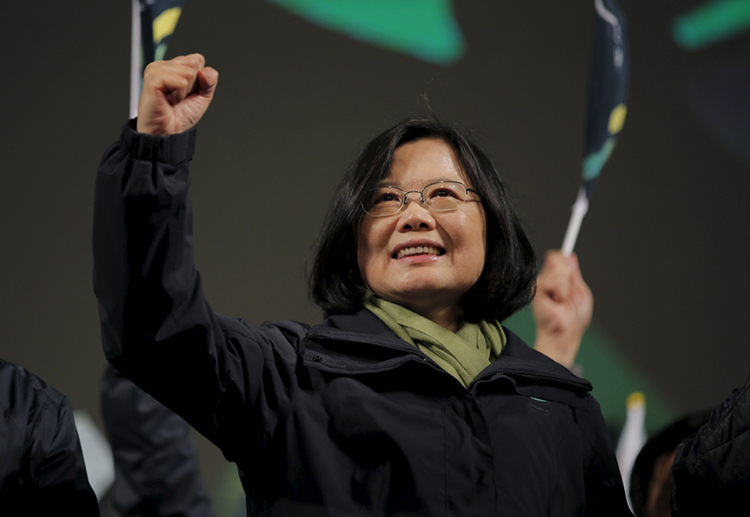Current Events Lesson Plan: May 19-25, 2016
Current Event: Taiwan’s Woman of Firsts: Tsai Ing-wen
Recently, Tsai Ing-wen became the first woman president of Taiwan. Tsai, of the Democratic Progressive Party, was elected back in January, easily defeating Eric Chu of Taiwan’s incumbent—and long dominant—Kuomintang party. In the few months between election and inauguration, Tsai assembled a new Cabinet and appointed people to senior government positions, leaning on professional capacity over partisan politics. She announced green energy and biotechnology initiatives aimed at improving Taiwan’s faltering economy. Tsai also vowed to keep Taiwan in the Trans-Pacific Partnership free-trade agreement and maintain strong investment in national defense. Taiwan’s most pressing issue, however, is its often-rocky relationship with its giant neighbor across the Taiwan Strait, the People’s Republic of China. Tsai has vowed to protect Taiwan’s democracy and freedom. Tsai Ing-wen was born on Aug. 31, 1956, in Fangshan Township, in Pingtung County in southern Taiwan. By the time Tsai was a teenager, her family had moved to Taipei. Tsai studied law in Taiwan, the United States, and the United Kingdom. She taught law in Taipei before entering politics.

Democratic Progressive Party (DPP) Chairperson and presidential candidate Tsai Ing-wen gestures to her supporters after her election victory at party headquarters in Taipei, Taiwan January 16, 2016. Credit: © Damir Sagolj, Reuters
Objective:
Taiwan is a mountainous island in the South China Sea, a part of the Pacific Ocean. Taiwan lies about 90 miles (140 kilometers) off the Chinese coast. China sees Taiwan as a breakaway province, but Taiwan considers itself an independent nation. Under current conditions, Taiwan largely acts independently but refrains from provoking China by not openly proclaiming its independence. Most Taiwanese people are of Chinese descent. Nearly 2 million people fled to Taiwan from mainland China just before the Communists took power of China in 1949. Taipei is Taiwan’s capital and largest city. Most of Taiwan‘s population lives on the coastal plain that makes up the western third of the island. Taiwan has one of the strongest economies in Asia. Taiwan’s economy relies heavily on manufacturing and foreign trade. It is one of the world’s largest producers of computer equipment and electronics.The Behind the Headlines news story and related World Book articles explore Taiwan and other countries.
Words to know:
Discussion Topics:
1. Ask your students what they know about Asia. (Students might say that Asia is the largest continent in both size and population; most of Russia, the world’s largest country, is in Asia; China and India, the world’s two most populous countries, are in Asia; the world’s highest (Mount Everest) and lowest (Dead Sea shore) places are in Asia; the world’s major religions began in Asia—Buddhism, Christianity, Confucianism, Hinduism, Islam, and Judaism.)
2. Ask your students to name some women who have been elected to high office throughout the world. (Students might say Corazon Aquino of the Philippines, Benazir Bhutto of Pakistan, Indira Gandhi of India, Julia Gillard of Australia, Golda Meir of Israel, Angela Merkel of Germany, Park Geun-hye of South Korea, Jenny Shipley of New Zealand, Margaret Thatcher of the United Kingdom.)
3. Ask your students to use World Book’s Timelines feature to view or add to the Asia: 1950’s to Present timeline. (Students may wish to use the “History” section of World Book’s “Asia” article for help.)


